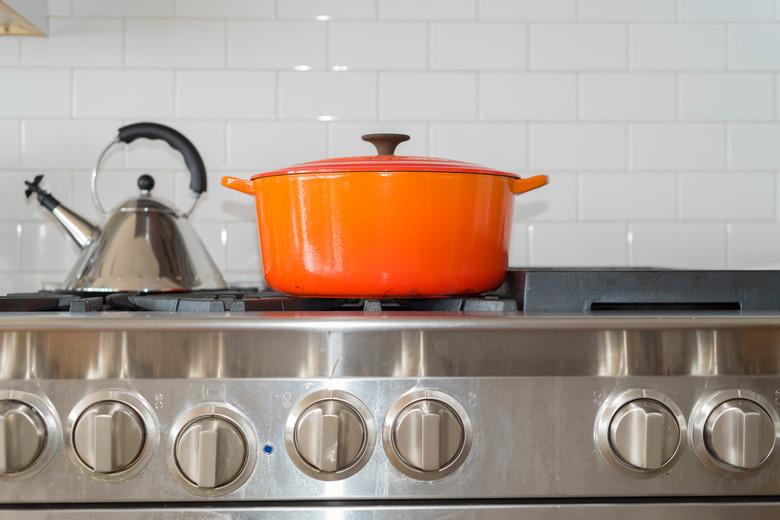What Causes A Hissing Sound On A Gas Stove Cooktop?
A gas stove making noises can be disconcerting to consumers who've always had a quieter electric range. But after a learning curve, these unfamiliar sounds simply become a normal part of a kitchen's chorus, joining the hum of a refrigerator and the roar of a garbage disposal. A hissing sound on a gas stove cooktop accompanies a clicking noise as the burners ignite. But if the hissing sound is louder or lasts longer than usual, you may need to adjust the air shutter or clean the clogged burner heads.
Tip
A hissing sound on a gas stove cooktop is caused by the mixture of air and fuel that ignites the burners.
Gas Stove Making Hissing Sound
Gas Stove Making Hissing Sound
To ignite the burners, a gas stove mixes air with fuel, resulting in a hissing noise. This air-to-fuel ratio may be off-kilter because of too much gas or too much air flowing to a burner, causing a hissing sound that's louder than usual. You may also notice yellow instead of blue flames or yellow-tipped flames. Adjusting the air shutter normalizes the air-to-fuel ratio.
Dan-Marc Appliance notes that you don't have to work with any of the gas line parts to adjust the air shutter, but you'll still want to shut off the gas supply to your stove before making any adjustments. Lift up or remove the top cover of your stove, which means you'll first have to remove the burner grates and possibly the burner heads and control knobs. Find the burner tube underneath the burner head and find the air shutter slot, which has a screw next to it.
Using a screwdriver, turn the screw so the slot becomes larger or smaller. If you've seen yellow flames instead of blue flames, you'll probably need to adjust the slot so that it's smaller to reduce the airflow. Adjusting the air shutter is a trial-and-error project, but your goal is to adjust the flame until it is perfectly blue.
Gas Stove Making Noises
Gas Stove Making Noises
Other than the hissing sound that a gas stove makes, you may also hear clicking or whining noises. If your gas stove sounds like it's whining, the air shutter may need to be adjusted. But if that doesn't stop the whining noise, the sound may be coming from the gas regulator as it struggles to regulate the pressure of the gas that's sent to the burners. When the whining noise is caused by the gas regulator, you may want to leave this adjustment and/or repair to a professional technician.
The clicking noise you hear comes from the igniter, which is making a spark to ignite the gas when you turn on a burner. As soon as the flame ignites, the clicking stops. But if the clicking continues after the burner is ignited or if you hear your gas stove clicking when not in use, the culprit may be a faulty switch or faulty spark electrode.
You may also hear a clicking noise if a pot boils over. The moisture causes the igniter to turn on. All you need to do is turn off the burner. If the gas stove igniter keeps clicking when off, you can turn off the electricity to the stove and let the stove thoroughly dry for several hours. Mr. Appliance recommends turning on your oven for 30 minutes at a temperature of 350 degrees F to help dry the burner spill from underneath it.
If You Smell Gas
If You Smell Gas
Smelling gas is not part of the normal operation of your stove. You may, however, detect a faint odor of gas because someone turned on the burner partway without lighting it. Immediately turn off the burner; and if the gas smell persists or if you smell gas for any other reason, do not turn on the oven, use any appliance or turn on a light switch. Leave home and call your gas provider so they can investigate a possible gas leak.
